When we read stories of good vs. evil, we often see a clear demarcation between heroes and villains. One aspires to protect and save, the other to destroy and waste.
Then there’s stories like The Boys that come along and shatter that demarcation into nothing.
Now I’ve discussed this series in a few other posts about character: about inserting trauma into backstory, providing a moment of vulnerability so readers see layers, and making characters face Monsters readers know all too well.
But now it’s time to define the, well, indefinable. The hero who’s beyond all redemption.
The antihero.
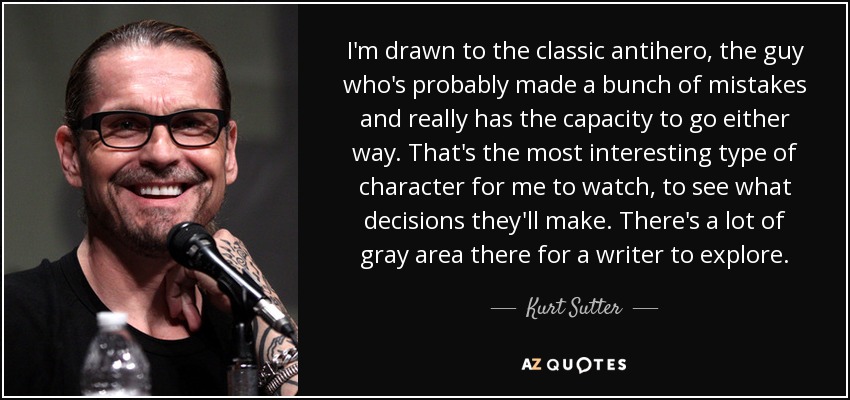
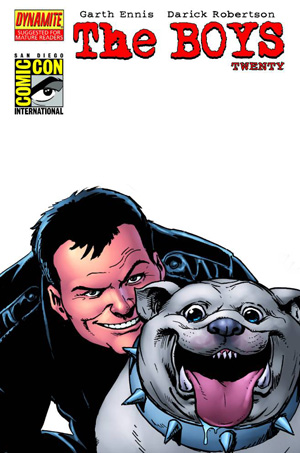
Billy Butcher is the leader of The Boys, a government-backed group created to keep the corporate-backed super-heroes from taking over the world. Butcher meets all the marks of a tragic hero. His wife Becky was raped by Homelander, the most powerful of all the superheroes (aka “supes”), and died when his unborn baby tore its way out of her stomach. The baby nearly killed Butcher with laser vision, forcing Butcher to beat this baby to death while his wife bleeds out in front of him.
Tragic backstory doesn’t get much darker than that.
From a writer’s standpoint, it’s shocking that we learn this much about Butcher by the sixth issue of the series–six out of seventy-two.
Why do we get this monumental information so early? Isn’t this the sort of thing that’s dropped further on down the plot, when reader engagement is high and they want to know more about where the characters come from? After all, we don’t get the backstories of M.M., Frenchie, or The Female until Issue 35.
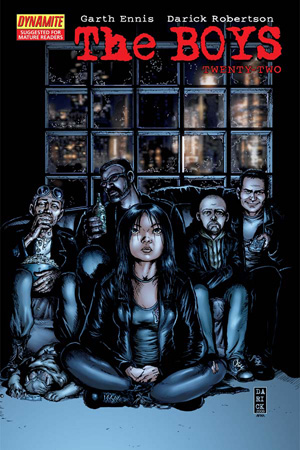
First, Butcher’s using the information to motivate Hughie, the protagonist readers follow through this series, to join The Boys. Hughie himself lost his girlfriend when the hero A-Train crushed her against a wall during his fight with a villain. Mutual loss bonds the two characters.
Loss isn’t all that drives Butcher. There’s a reasoning–a philosophy, if you will, or a code. It takes me back back to the stories of the “lawless” West, or even the classic Robin Hood; just because a man is lawless doesn’t mean he’s rule-less. It only means his rules and society’s laws don’t sync up. Now whether his rules benefit others outside himself could be up for debate, I’d say–Clint Eastwood’s Man With No Name comes to mind. He’s clearly out for personal gain in For a Fistful of Dollars. Sure, he helps a kidnapped woman and her family escape, but that’s only to screw around with two warring families whom he’s scamming for all they’re worth.
Butcher, too, has his own set of rules, and he doesn’t care if they jive with anyone else. He tells the CIA director in Issue 1:
Superpower’s the most dangerous power on Earth. There’s more an’more of’em all the time, an’ sooner or later they’re gonna wise up. If you can dodge bullets or outrun tachyons or swim across the sun, you’ve better things to do with your life than save the world for the two hundredth time. One day, you might twig what you’re really invulnerable to is your humanity. An’ then God help us all.
Butcher to Dir. Rayner, “The Name of the Game” Part 1
A lot happens to prove Butcher right. The Boys fight a huge number of supes who rape and kill for fun, their atrocities almost always covered up by the Vought Corporation. The public goes right on devouring the stories told in Vought’s comic books like they’re the truth of the world. One by one, Butcher marks The Boys’ targets and plans how to take that team of supes down.
Everything he does or says serves whatever it is he got planned. He don’t waste nothing’–not time, not words, not effort. Not even a goddamn smile, Hughie.
Mother’s Milk to Hughie, “Get Some” Part 2
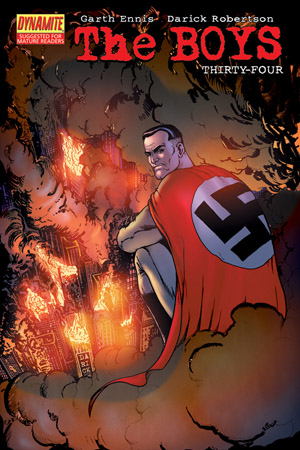
The Boys maim and kill a number of supes, be they street teams or a Nazi disguised as a Norse god. So long as they’re just killing bad guys justice won’t touch, then everything’s okay, right?
Right?
This is what we tell ourselves. As readers, we escape into stories to see comeuppance served because so often the justice served in reality is unsatisfactory. In fiction, the detectives catch the bad guy. The villain’s plot to take over the world is thwarted. The bad guys, the really bad guys, pay for the crimes.
Characters can be antiheroes who do horrible things because they’re still heroes, if only just. We’re sure there’s something good in them, and we’re willing to wait out the horrible things in order to see that goodness come to light.
And we see Butcher with that goodness, if only just. The miniseries Butcher, Baker, Candlestickmaker takes readers into Billy Butcher’s past. We meet Becky. We see her and Billy Butcher fall in love, get married. We see the charming side of this antihero, and his heart.
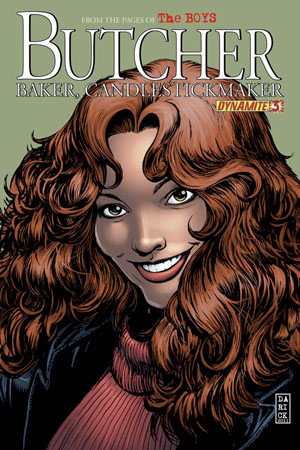
We see Becky die, and the aftermath.
Loss rarely breeds good things. Strange, how often we look for tragedy in our heroes–the loss that drives them to fight for justice, for making things right. We forget that revenge and ambition do not always lead to bettering the world. Clint Eastwood comes to mind again, this time as Dirty Harry in the film Dirty Harry: Magnum Force. There’s a crew of cops out to take justice into their own hands, and they want Harry to join them.
It’s the Point of No Return. Harry is invited to cross it, but he refuses.
Butcher, on the other hand…well. He crossed it long, long ago.
Readers get a preview of Butcher’s true nature in Issue 14, when he sets off a genetic detonation device that kills 150 supes who did took money to help start a coup in Russia. In Issue 28 (The G-Men series I’ve written about before) Butcher is fine killing a supe team of teen boys; later, if not for Hughie, Butcher would have killed a team of mentally challenged superheroes simply for cussing in front of him. These two teams weren’t trying to overthrow any government. Heck, some were genuinely trying to help the citizens of their town.
Where is this antihero’s rules, his personal code? Butcher gives one version of his code to Hughie after the G-Men slaughter:
But we ain’t here to make things better, are we, Hughie? We’re here to stop’em from gettin’ worse.
Butcher to Hughie, “We Gotta Go Now” Conclusion
Okay, that sounds somewhat justifiable. There are many problems in the world that can’t be eradicated. Sometimes containment’s the best one can hope for.
But a flashback with Butcher’s mentor Col. Mallory sheds a brighter, nastier light on the true rule Butcher lives by no matter what the rest of the world says. When Butcher and Mallory discover a convention of supe children have all been gassed to death, Butcher doesn’t care. To Butcher, the only good supe is a dead supe.
I’ll tell you how you neutralize the potential threats: you f***in’ drop the lot o’ them. Every single arsehole in tights, you do’em…No one should be allowed to walk around with what they’ve got, it’s just too much of a risk.
Butcher to Mallory, Issue 55
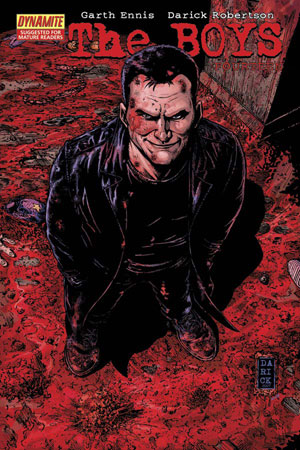
As far as Butcher’s concerned, any super-human of any kind must die. It doesn’t matter what he/she did or didn’t do. It doesn’t matter who that person is, if they were born with the powers, or if Vought injected them with the DNA-altering chemical Compound V to create those powers. If a person has powers, they deserve to die. Mallory even warns Hughie to watch his back around Butcher, because for Butcher, this personal war with the supes is never going to end.
There is no one on earth who hates like that man does.
Mallory to Hughie, Issue 55
I’m not going to tell you how far Butcher will go in his personal war–I’ll let you find out via the comic series or the upcoming TV show.
(Warning: the trailer’s pretty true to form with the comic, so carnage and cussing abound. Only watch if you can handle that sort of thing.)
Antiheroes are compelling because we really, honestly, truly do not know what they’re willing to do in order to fulfill their code. There’s a level of wretchedness we expect heroes will not sink to; there’s a level of goodness we expect villains will not aspire to.
But antiheroes don’t give a shit about reader expectations or presumptions. They will do whatever it takes to reach their goal.
And readers cannot help but follow, compelled to discover what goal could be worth such a path taken through the shattered demarcation between good and evil. With every step taken readers’ feet will bleed upon the shards, and like the antihero, readers will complete the journey…but will never be the same.
~Stay Tuned Next Week!~
More interviews with authors both indie and award-winning are lined up for your enjoyment, as well as a journey with Bo and me into the mysterious North Woods where a ghost stands, lonely and waiting. On top of all that, I’ll be taking you into the Wild West for some fantasy adventure. Bullets and magic will fly…just not to the Will Smith song. Pleeeease not to the Will Smith song…
Oh, and just to toot my own horn for a second, I’ve written my own batch of flawed characters with their own Points of No Return to cross…or not.
You can check out my novel here.
Read on, share on, and write on, my friends!
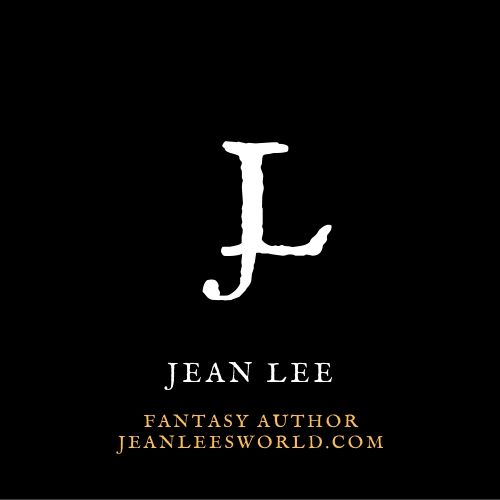

‘When we read stories of good vs. evil, we often see a clear demarcation between heroes and villains. One aspires to protect and save, the other to destroy and waste’. I think you’ve defined not just fiction type subjects but reality as well. Words, music, painting, life – all art in fact and real people as well ~ George
LikeLiked by 1 person
Thanks, George!
LikeLiked by 1 person
These are a comic and movie I will never view, but it’s great to have your overview.
LikeLiked by 1 person
Many thanks, Peggy! Oh I totally get this series isn’t for everyone, and that’s okay. 🙂
LikeLiked by 1 person
I must admit you recommendation led me to actually spending a bit of cash on The Boys. It is very dark and most awesome. Unfortunately it has to be kept out of sight of the son. Anti Heroes just spice up a plot and are often more believable than pure heroes or evil villains.
LikeLiked by 1 person
YES! Heavens, me rereading the series took forever because of the kids. “Whatcha readin’, Mommy?” “Um, uh, what’s that shiny thing over there? GAH DON’T OPEN THAT COVER!”
🙂
LikeLiked by 1 person
Kurt Sutter has it right. Well for me anyway. I ain’t interested in the hero hero. And your post really does them justice x
LikeLiked by 1 person
Thanks, Shey! So often we find that the truly complete characters, good and bad and all that’s in between, are often driven by something we can all relate to. xxxxxxx
LikeLiked by 1 person
I couldn’t agree more. We are all the sum of various parts. xxxxx
LikeLiked by 1 person
Billy Butcher does have a tragic back story that adds depth to his character and I imagine the story as well.
Sometimes, writers fail to give their antagonist the depth of a tragic/ life changing event. It makes the character richer, darker, and makes his motives more compelling. Thus the character and story are more life like.
LikeLiked by 2 people
Yes, exactly so. Villains should not be villains just because. There must be a *reason* for it. Any time I read a story where the villain has no motivation, the rest of the story just crumbles apart.
LikeLiked by 1 person
Exactly. With the right villainous motivation he can become a sympathetic figure readers will love in his madness.
LikeLiked by 1 person
oh wow, guess what I’m watching on Amazon Prime. Yes, if there is a flawed anti-hero it’s Butcher, or if you watched Falling Skies, Pope.
LikeLiked by 1 person
I’ll have to scope out Pope, thanks!
LikeLike
Reblogged this on lampmagician and commented:
Great explanation by a Great author Jean Lee 🙏❤❤🙏
LikeLiked by 1 person
Ah, once again you are too kind, my friend! xxxxx
LikeLiked by 1 person
Thanks Jean..on reflection and based on the books I have recently read… I would say that the dark characters rarely have their back story told, it seems much of the time that just saying they are evil is sufficient.. need to watch that in my own writing..
LikeLiked by 1 person
True! Of course for some readers, knowing the villain for being villainous is sufficient enough. And I’m sure that for some stories, the backstory of the villain doesn’t necessarily play to the plot at hand. But there must be a reason for the villain to be a villain. Otherwise, what makes the story move forward at all, you know? It’s something I have to watch out for in my own writing, too. It’s a toughie!
LikeLiked by 1 person
RE-posted on twitter @trefology
LikeLiked by 1 person
Thanks!
LikeLiked by 1 person
So interesting! I believe antiheroes add multidimensional characters to the mix and that’s important. But, I guess all good characters are psychologically complex. I can’t watch carnage, but your post intrigued me—almost convinced me. Thanks!
LikeLiked by 1 person
Thanks for reading! No, if carnage is not your thing, do NOT get into this series. Honestly, this is one of my favorite things to reread for the complexity of character and story, but at the same time I feel like I have to slap warning stickers aaaaaaaaaaall over it because I know this level of darkness isn’t made for all readers. Frankly, when I heard Amazon Prime was adapting the series for television, I got worried because I figured there’s no way the series could go as dark as the comic. I guess we’ll see!
And yes, I love having characters of so many grey layers. A villain can still be a villain even with a few redeeming features/actions, and a hero can still be a hero even with a few despicable features/actions. Souls only good or bad can be so boring! 🙂
LikeLiked by 1 person
“But antiheroes don’t give a shit about reader expectations or presumptions. They will do whatever it takes to reach their goal.”
A really interesting post, thank you. I was particularly intrigued because! the theme for this year’s Witch Week event at the end of October is ‘Villains’, and I’m hoping that the guest posters will delve into that disputed territory between heroes, antiheroes and out-and-out villains, whether they be sociopaths, psychopaths or whatever. Your post has given me a bit to think about
LikeLiked by 1 person
Oh good! Yes, I think some of the best characters are the ones who walk aaaall over that demarcation. Hmm…Catwoman’s a great example of this. Sometimes she’s helping Batman (or, you know, his gf, but I digress), sometimes she’s the villain he’s after. There’s a reason she’s such a memorable character (apart from the one-piece leather suits, that is): it’s because she’s always fighting for her own ends, not “just because.” Mr. Freeze is another wonderful example (Okay, I’m not getting into the fantasy here, but I gotta include him, sorry!): a man wronged by his employers, wife terminally ill, frozen until this brilliant doctor can find a cure. He turns to criminal activity for revenge and to save his wife. I mean, that’s some compelling, powerful motivation!
(Which is why it’s so (*#%(*#$ frustrating the movies just keep harping on the Joker. Idiots.)
Anyway.
Do you have some stories already in mind?
LikeLike
This 👉🏻 https://wp.me/s2oNj1-mischief explains all! 🙂
LikeLiked by 1 person
An interesting introduction, Jean. You’ve managed to intrigue me, and I would have said I’d reached saturation point when it comes to comic heroes. This is a good reminder of the need to have characters who will take risks, the kind of risks that would be unthinkable in real life.
LikeLiked by 1 person
Oh I’m saturated too, Cath. I haven’t seen a comic book movie since…um…since before Avengers came out. Partly because the fun’s gone not being able to see them with Dad, but the joy of seeing those stories, so cookie cutter with the “world will be destroyed!” plots, just gets old after a while. I give Garth and Darick volumes of kudos for venturing into an area I don’t think many people like to enter, because people don’t want to think super-humans would disconnect from their humanity so easily, but when you consider what so many celebrities are like, why should we be surprised? (There are some comics that do explore other fascinating possibilities–like what if the spaceship of baby Kal-lel (Ka-lel? Kalel? whatev) crashed in Soviet Russia instead of the US, or what if the Kents weren’t the ones who found the ship because their car got a flat tire.)
LikeLiked by 1 person
‘Cookie cutter’ is my feeling, I think. Plus so many of them seem to go down the deus ex machina (god from the machine) route – which must be so tempting when dealing with super-heros, since they have ‘god-like’ powers anyway.
LikeLiked by 1 person
Exactly. I think that’s why I dug Batman so much as a kid–granted, he had all tech, but the Animated Series of the 90s emphasized his detective skills, which was awesome. Many of the X-Men were pretty good, too, because they’re powers all had serious limitations; sure, Rogue could fly and was super strong, but if she touched anyone she’d start draining their life-energy, so she can’t even hold someone’s hand. Sure, Cyclops has powerful eye laser beams, but if he doesn’t constantly wear his eye gear, he’d laser everyone in half. The mutant powers all came with legit curse-like elements to living, yet somehow they still struggle to do some good. Not all their stories are great, but there are still some really good ones…that have never made it to the screen…
LikeLiked by 1 person
All I could think of while reading this was imagine having something you wrote turned into a series starring Hugh Jackman. Blood, carnage, and untold amount of destruction aside, what incredible joy! :0)
LikeLiked by 2 people
LMAO! Oh Hugh Jackman’s such a treasure. Wouldn’t he be a thrill to see sing and dance on stage? Pretty sure I’d faint if he was ever in something I wrote! xxxxx
LikeLiked by 2 people
Me, too!🥰
LikeLiked by 1 person
It looks hilarious and far too dark for wussy ol’ me – but of course, you are talking about those flawed characters who straddle the line between good and evil – most of us, in fact. Shakespeare always featured them – none of his major heroes were spotless, they all had weaknesses.
And as for the sense that those who have unique, special talents are also doomed to hapless, often loveless lives – that was an idea knocking around in Greek times… I’ve recently finished listening to Stephen Fry’s marvellous retelling of the Greek creation stories – Mythos and have just got hold of the next book audiobook, Heroes…
The sense of this type of fiction is that to warn us that the world isn’t fair – that we need to be on our guard. Don’t stand out too much, don’t strive for too much – and whatever you do, don’t be too beautiful, or draw attention to it. Great article as ever, Jean:))
LikeLiked by 1 person
FRY HAS ANOTHER BOOK?!?!
Ah, I was thinking so much of my lovely westerns, I didn’t even think of stepping further back! Thanks so much for expanding on this further. We could keep going on this type of character, couldn’t we? Maybe that’s why we love them: because there IS that depth worth exploring.
Thanks so much for reading, my friend! Praying the sun is a little brighter by you today. 🙂 xxxxx
LikeLiked by 1 person
Thank you! Well… they have taken down the dangerous canopy and bricked up the space, with minimum fuss or damage, which I’m very grateful for… They are replacing the front door and doing the repointing necessary next week.
LikeLiked by 1 person
Good. At least the repairs are moving along. I remember when we had to get a chunk of our roof replaced after the windstorm, the roofers spent MONTHS putzing about with the insurance company. We had a tarp strapped there, and just prayed another windstorm wouldn’t rip it off.
LikeLike
Yes… sadly we are not able to make an insurance claim as it is general wear and tear:(.
LikeLiked by 1 person
Weeeell shit.
But I know that feeling. We didn’t realize our insurance plan didn’t cover flooding until after, you know, the flooding.
LikeLiked by 1 person
Yep. I sometimes wonder why we bother…
LikeLiked by 1 person
Ditto.
LikeLiked by 1 person
This is a topic near/dear to my villainous heart. Thanks for sharing.
LikeLiked by 1 person
And thank you for reading! 🙂
LikeLike
Pingback: For the love of #westerns: one #indieauthor #writes her #fantasy world into a #timeless #genre. | Jean Lee's World
Pingback: #lessons Learned from #GarthEnnis and @DarickR: #Write #Heroes Who Know No Odds. | Jean Lee's World